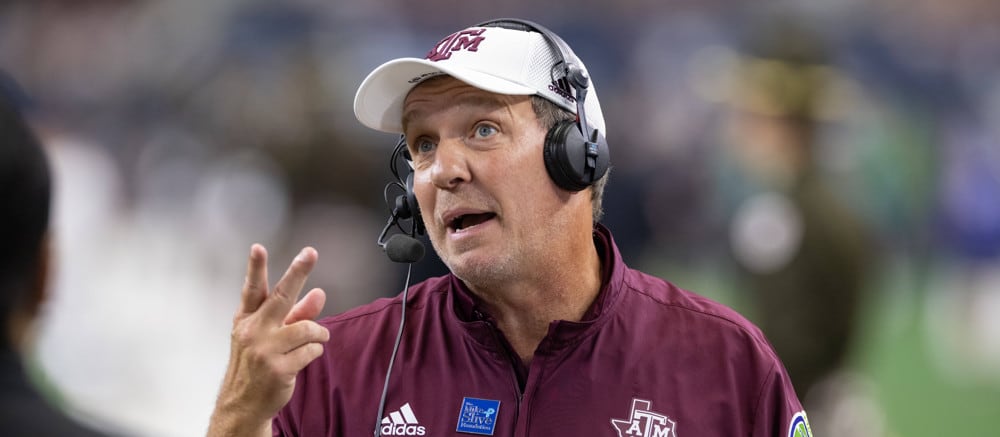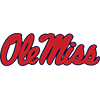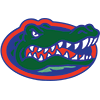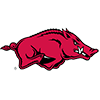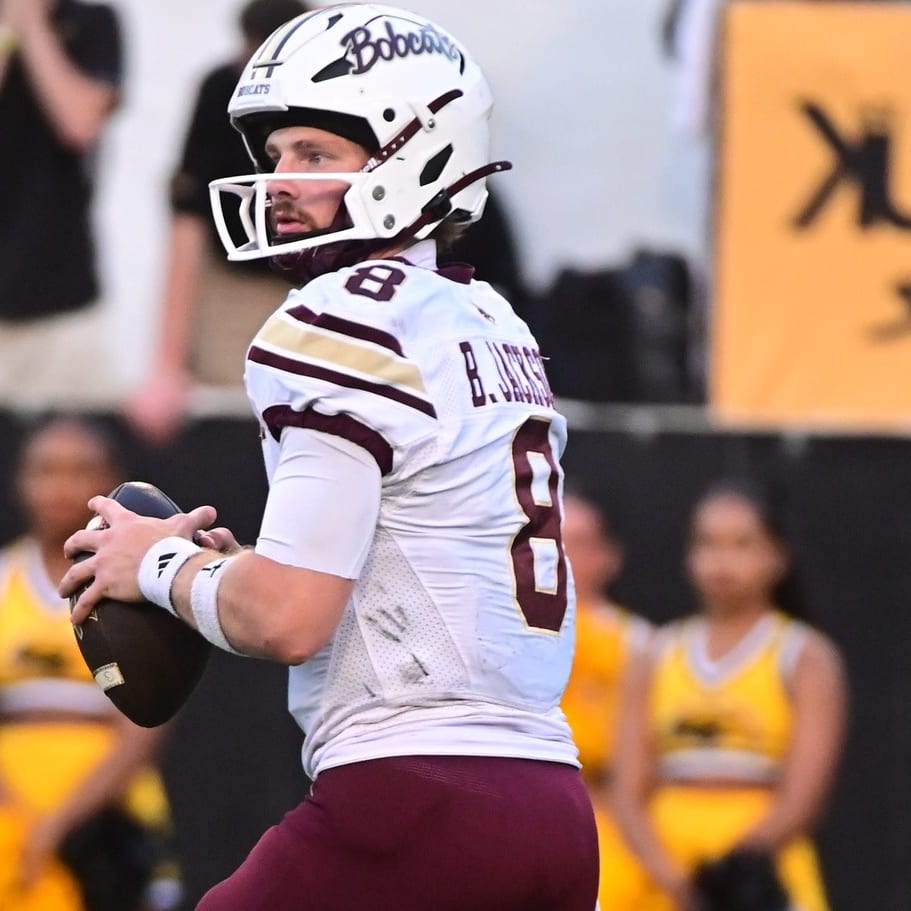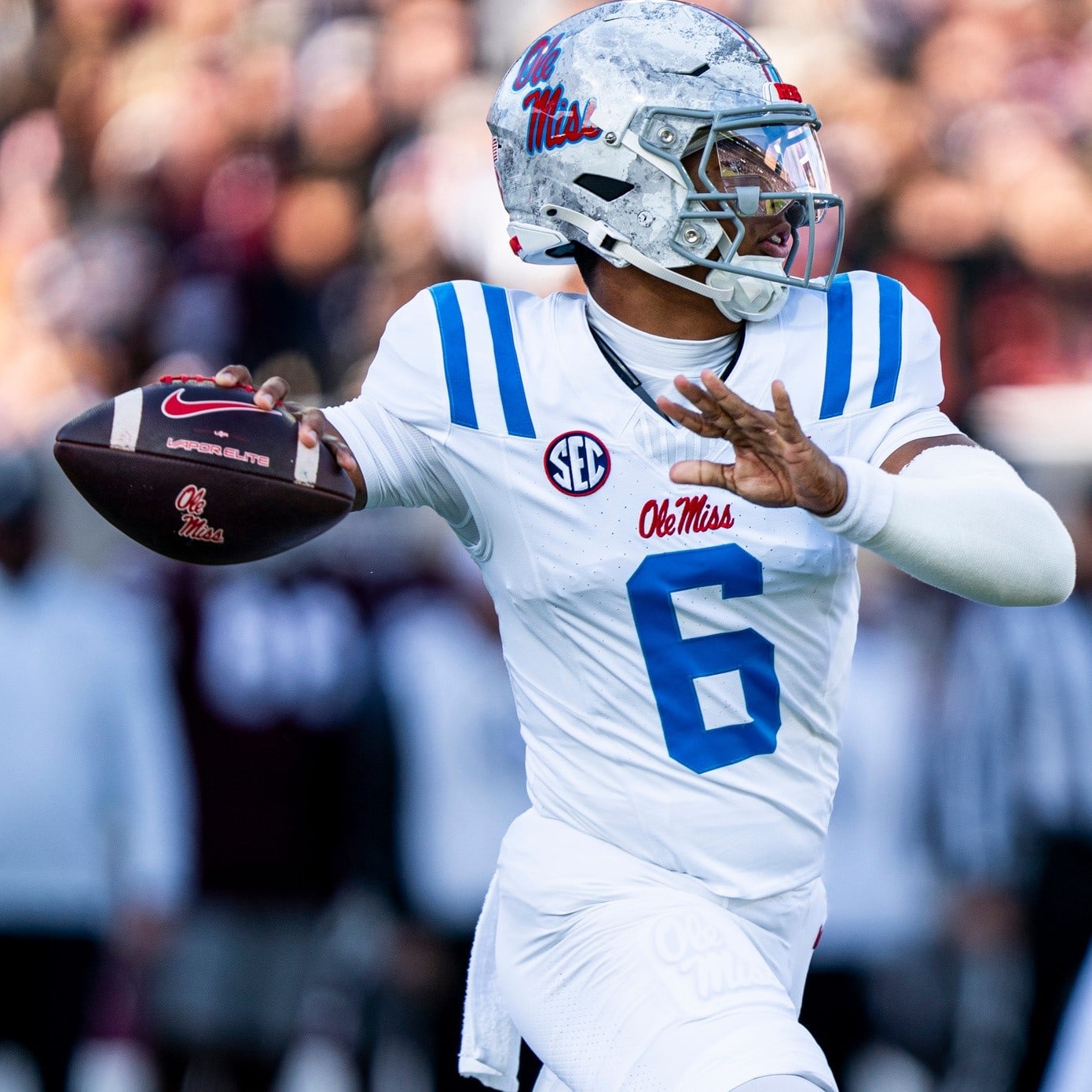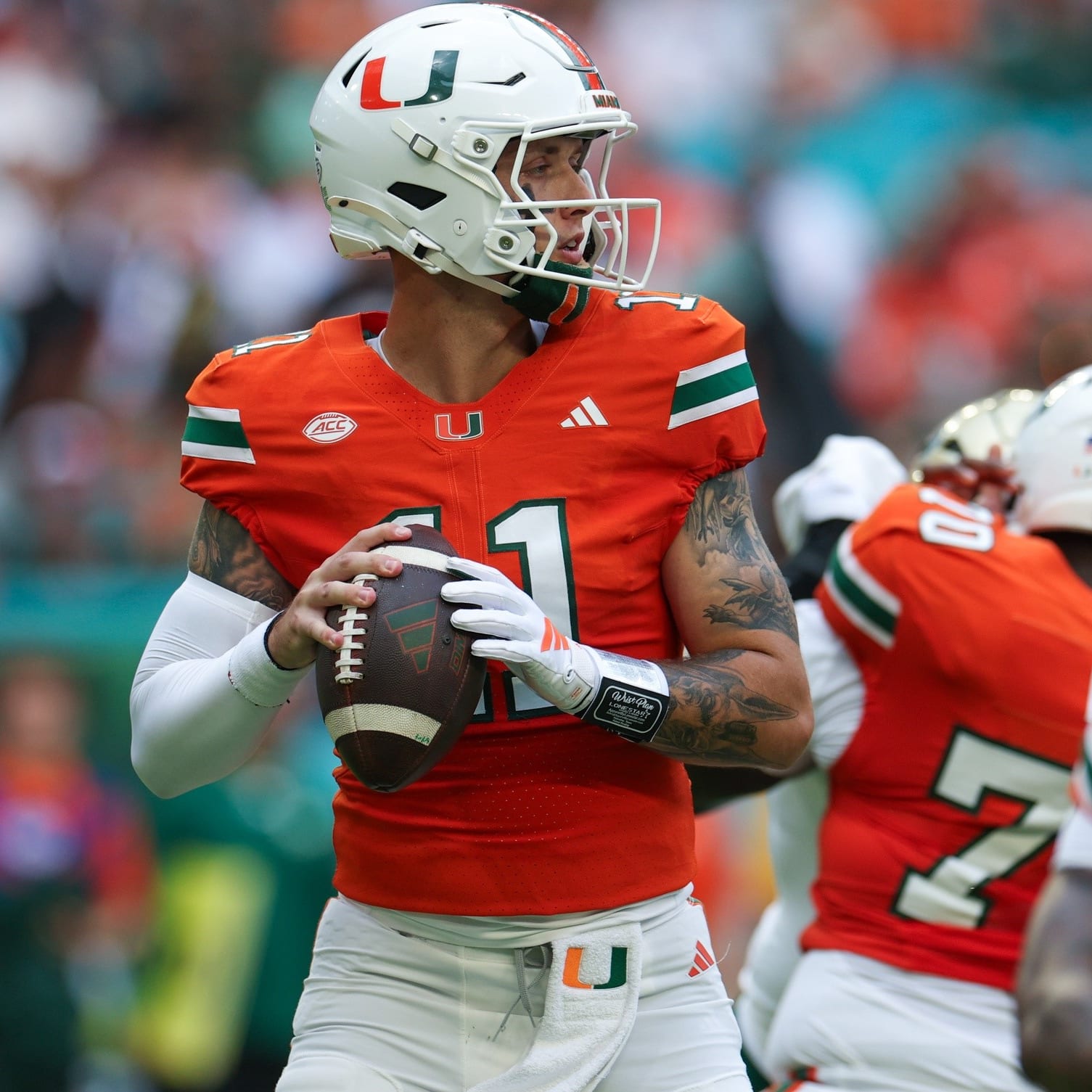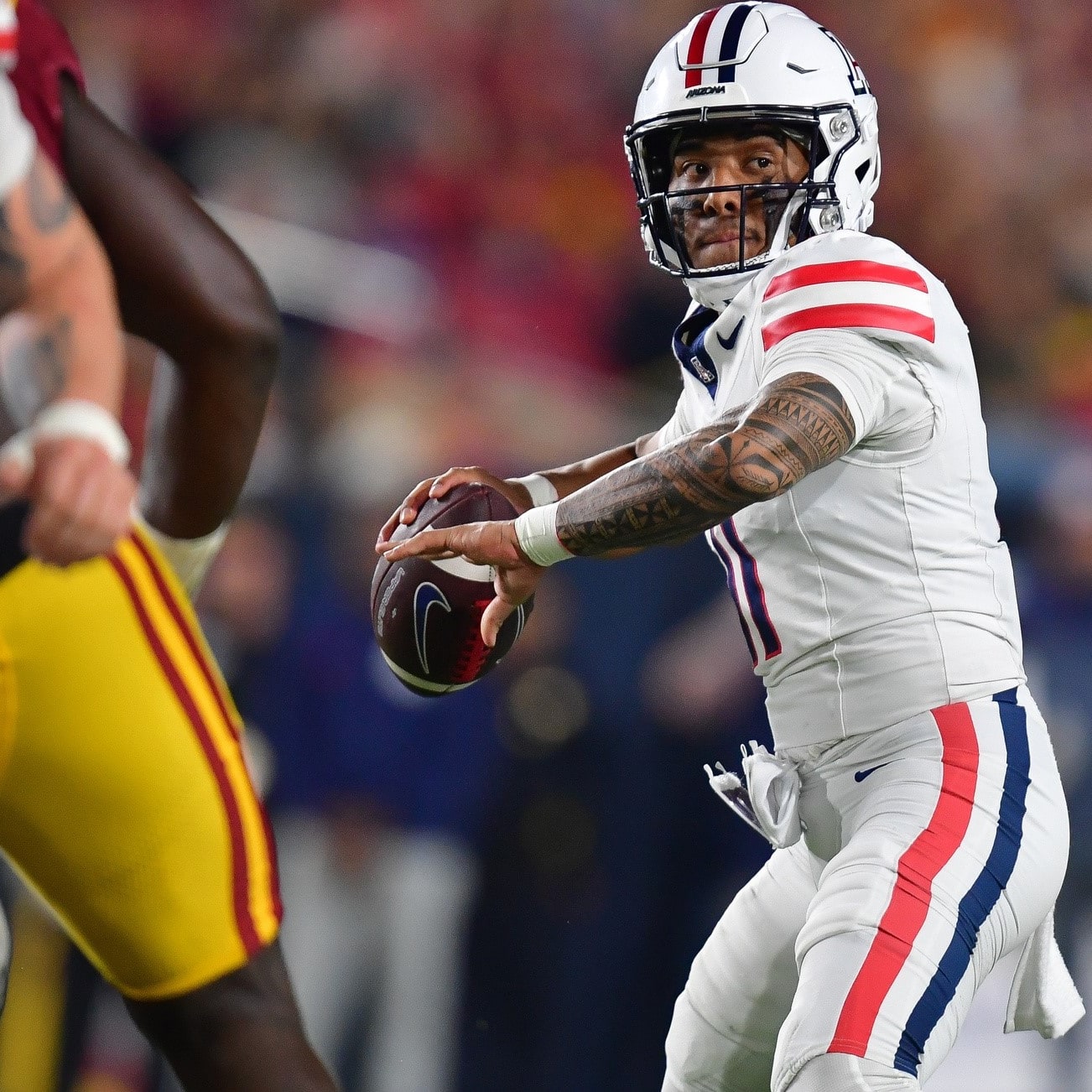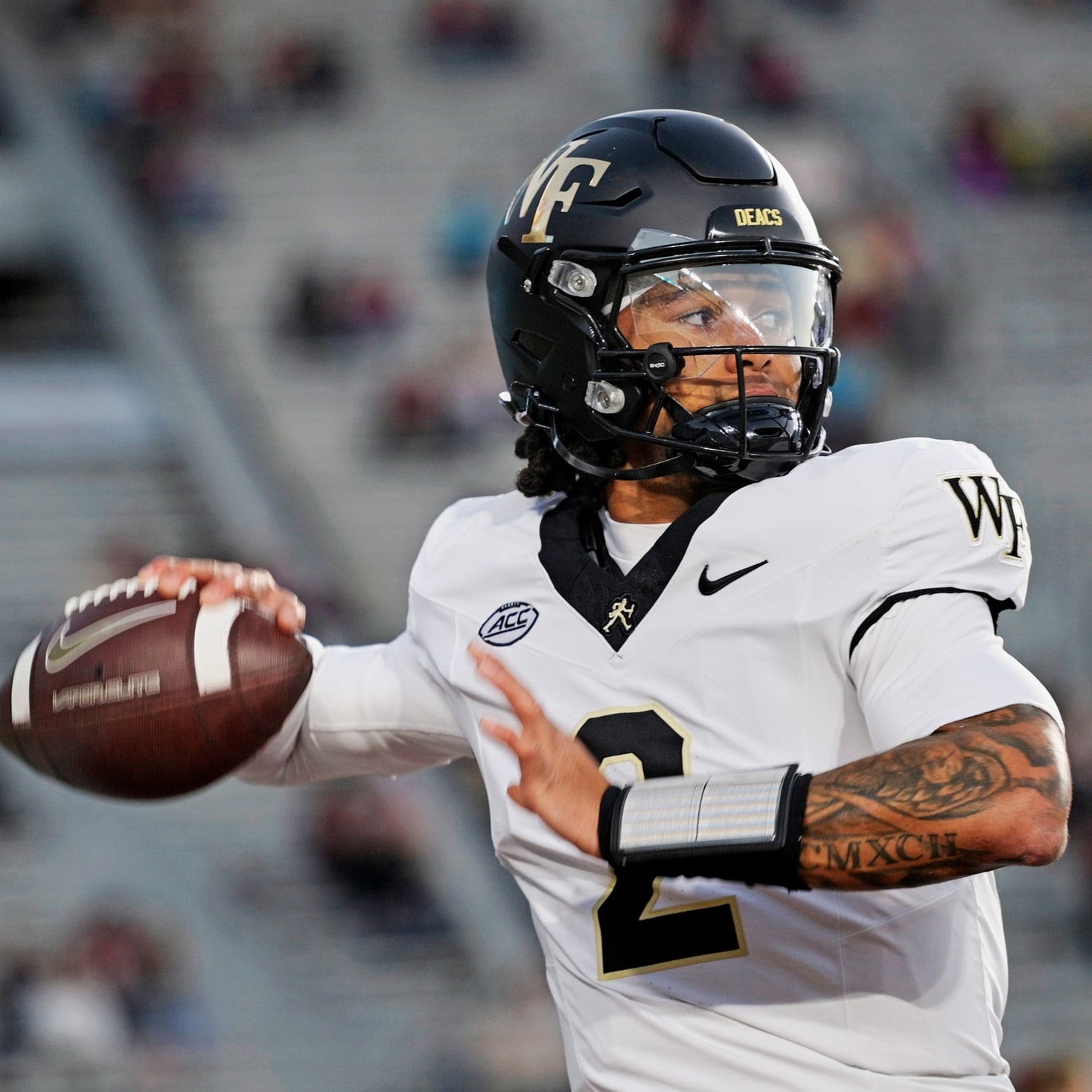The 2022 recruiting cycle is officially in the books after Wednesday's signing day. While early signing day and the transfer portal have both diminished the significance of the February signing day, there was still some intrigue as the final pieces of the recruiting puzzle were put in place. In this article, I dive into the 2022 winners and losers from a macro perspective, looking at some programs that exceeded or failed to meet expectations. I also identify some prospects who should be on your CFF redraft radar this season.
Winners
Texas A&M 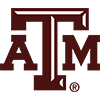 1st Nationally, 1st in SEC
1st Nationally, 1st in SEC
You can come off a mediocre season and still land a Top 10 class. But No.1 overall? Well when you're Texas A&M and you have unlimited financial resources in a time where NIL is fully above board, you can do it. That's not to take anything away from Jimbo Fisher's recruiting efforts, it's just to say that Texas A&M was one of those programs due to benefit from NIL the most.
The Aggies check in with the top-rated class that is officially the highest-rated recruiting class of all time according to the 247 Sports Composite rankings.
BREAKING: Texas A&M clinches the No. 1 class in 2022 — and of all-time!https://t.co/J6v2ObzVkz pic.twitter.com/eTeR3L1EJn
— 247Sports (@247Sports) February 2, 2022
They landed seven five-star recruits according to 247 (Shemar Stewart, DL; Evan Stewart, WR; Gabriel Brownlow-Dindy, DL; Conner Weigman, QB; Denver Harris, CB; Walter Nolen, DL; Chris Marshall, WR) and four of them have already enrolled. In all, Texas A&M landed commitments from 15 of the top 100 players in this cycle.
I wrote about Texas A&M's title chances for this year in the College Football Best Bets: 2022 Futures and a lot of its hopes, fair or not, will hinge on how quickly this class can start contributing. The Aggies lose a pair of projected first-rounders from both sides of the trenches and the quarterback situation is unsettled, though not bereft of options. However, there's still more than enough talent on this roster to compete for a berth in the SEC Championship. If a few of these freshmen pop early, you don't have to squint as hard to convince yourself of that notion.
Texas  5th Nationally, 1st in the Big 12
5th Nationally, 1st in the Big 12
It was a rocky Year 1 for Steve Sarkisian on the 40 Acres as the Longhorns didn't even find their way into bowl eligibility. That didn't stop Texas from inking a potentially program-changing class. The Horns did well in terms of getting highly regarded kids out of high school but their efforts in the transfer portal are what put this class over the top.
Obviously, Quinn Ewers is the headliner as he returns to his native Austin after a year at Ohio State. Ewers is one of the highest-rated quarterback recruits of all time and after Texas' struggles at that position last year, he could be the key that unlocks the full potential of Sarkisian's offense. Adding pass-catchers like Jahleel Billingsley from Alabama and Isaiah Neyor from Wyoming (rated as a four-star as a transfer) gives Ewers more firepower to work with in addition to established stars like Bijan Robinson and Xavier Worthy.
Beyond the portal, Texas signed seven players in the top 150. Perhaps most notably, the bulk of those players are ones that fit major areas of need. Kelvin Banks was the No.3-ranked offensive tackle and the other commits in this category are either defenders or offensive linemen. Those are important building blocks, especially when Texas has lacked in those spots in recent seasons.
Texas is like A&M in that it has too many resources to not thrive on the recruiting trail in light of NIL's inception. It would be concerning if Texas signed a class outside the top 10 with all it can offer, but even with that high bar to clear, Sarkisian and company made it happen in this cycle and this is a group that could change the fortunes of this blue blood program that has been languishing in mediocrity for the last decade-plus.
SEC East's Second Tier
Missouri, Kentucky and Tennessee hold down classes ranging from 13th to 16th in the 247 Composite. Missouri (14) is obviously the big surprise from that group after a tough 6-7 season. Keeping St. Louis native and five-star receiver Luther Burden home was arguably the biggest recruiting win for any non-blue blood program in this cycle. Kentucky has evolved as a program and that progress is starting to manifest on the recruiting trail. The Cats inked the No.13 class headlined by No.37 overall player Kiyaunta Goodwin, the No.6 offensive tackle prospect in the cycle. Tennessee has to be happy with Josh Heupel's recruiting efforts. The Vols have had strong classes in recent years thanks to Jeremy Pruitt but they didn't translate because....reasons. The question surrounding Heupel when he took the job was whether he'd be able to hold his own on the recruiting trail in a conference that is second-to-none in that facet of program building. Heupel impressed in his first season at Tennessee and showed that his system can work in the SEC. Now he's showing that he can hang with the big guys in terms of winning on the trail.
Arizona  24th Nationally, 3rd in PAC-12
24th Nationally, 3rd in PAC-12
Jedd Fisch had a lot of cleanup to do in Year 1 and that was apparent on the field as the Wildcats had a miserable 1-11 season. To pull a top 25 class in the face of that is nothing short of impressive. Fisch took a hybrid approach, hitting the transfer portal hard to get some experienced talent in the mix in 2022 while also landing a number of high-profile high schoolers that we rarely see end up in Tuscon. The combination of Jayden de Laura (Washington State) and Jacob Cowing (UTEP) gives Arizona a pair of proven and talented players to lead the offense. Wide receiver Tetairoa McMillan is the highest-rated commit in program history and is one of five four-star recruits heading to Arizona. After a one-win season, there probably aren't a lot of starting spots that are set in stone heading into the season, and though none of Arizona's signees are early enrollees (thereby nixing their ability to help in spring), we can still expect to see a lot of the new faces making an impact for the Wildcats in 2022.
Honorable Mentions: Penn State (6th), Notre Dame (7th), Florida State (17th), Rutgers (29th!)
Losers
Clemson  11th Nationally, 2nd in the ACC
11th Nationally, 2nd in the ACC
It speaks to the standard that Dabo Swinney has set at Clemson when checking in with the No.11 class feels like an L. But this is a program that had set up shop inside the Top 10 for years and made appearances inside the Top 5 in each of the last two cycles. Again, finishing 11th in recruiting in the country doesn't sound bad on its face but by orders of magnitude, the difference between a Top Five class and the 11th is significant. To be fair, losing both coordinators certainly doesn't help and the class is still largely salvaged if quarterback Cade Klubnik is as-advertised.
Clemson is at a point where only Playoff berths and National Titles are the mark of a successful season and anything less is a disappointment. And looking at playoff history, teams that routinely rank outside the Top 10 in recruiting and still make it are outliers. This isn't to say that this year's recruiting haul is a sign of things to come, necessarily. But it puts added pressure on Swinney and the new coordinators to make sure it doesn't happen again.
Baylor  36th Nationally, 5th in the Big 12
36th Nationally, 5th in the Big 12
This might be harsh as Baylor is a program that prides itself on development more than one that endeavors to compete in the recruiting rankings arms race. Still, a Big 12 title and a Sugar Bowl victory should be enough to land you a top 30 class nationally and one that competes for third in the conference. The class is headlined by Armani Winfield (WR29, 4-star) and Kaian Roberts-Day (EDGE 25, 4-star) and 19 three-star recruits. It's a good enough class and Baylor's staff has a well-earned reputation for getting the most out of the roster. But at the same time, it's disorienting to see Vanderbilt's class five spots ahead of Baylor's.
UCLA 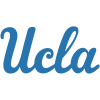 57th Nationally, 7th in the PAC-12
57th Nationally, 7th in the PAC-12
To be fair, UCLA probably gets dinged for the class's size more than its quality. The Bruins inked 11 total players but six of them rate as four-stars. So, it's a top-heavy class and getting high-end talent is obviously key. But so, too, is depth, and this class sorely lacks that. The Bruins also bolstered the class with some transfer but it's still an underwhelming haul overall. Chip Kelly continues to miss the mark on the recruiting trail.
Michigan State 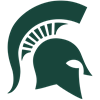 22nd Overall, 5th in the Big 10
22nd Overall, 5th in the Big 10
Michigan State's transfer portal efforts make this class better on the whole and recruiting class analysis has changed in light of the portal overall as well. But similar to Baylor, with the season Michigan State had, it would be fair to expect a class that challenged for a Top 3 spot in the conference. Albeit, Penn State is a force in recruiting despite recent on-field results. In terms of perspective, Michigan State finished 24 spots higher than it did a year ago, which is noteworthy and impressive. I still ding Sparty for not finishing ahead of Indiana, though.
Credit Where it's Due
LSU 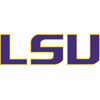
Coaching changes reliably hurt a team's recruiting class when they happen, so it's hard to assign too much blame to Brian Kelly even in light of his constant cringe-worthy moments since taking the job.
— no context college football (@nocontextcfb) January 28, 2022
I mean...
But seriously, LSU has done well for itself as it closed strong to finish 12th nationally and third in its division despite the coaching change and the rough season on the field. The Tigers vaulted up from 18th earlier in the week thanks to its strong finish. Inking five-star linebacker Harold Perkins on Signing Day was a great way to round out this cycle for Brian Kelly.
CFF Impact Freshmen
This is a class that's top-heavy in terms of non-fantasy relevant prospects. There are two players on the fantasy radar in 247's composite top 10, Luther Burden and Cade Klubnik, and the top-rated running back checks in at No. 30 overall. Perhaps that speaks to the fact that the five-star ratings are intended to reflect what the first round of the NFL draft looks like in terms of positional breakdown. Even so, there are breakout freshmen for fantasy every single cycle and it's important to get an early look at some of the candidates to help bolster your season-long and DFS efforts.
Quarterback
There simply aren't many slam dunk freshmen quarterbacks with a path to playing time this season. After Clemson's Cade Klubnik we have A&M's Conner Weigman, but he has two obstacles in his way in Max Johnson and Haynes King. Ty Simpson is the future at Alabama but he'll have to wait for Bryce Young to head to the draft after next season. Missouri's Sam Horn is the No.8 quarterback in the class and a top 150 player overall, so there's a path for him to make a case to start at some point during the season. Purdue already has Aidan O'Connell in the fold, so we'll likely be waiting until 2023 to see No.10 QB Brady Allen take over that explosive offense. Florida State landed QB11 in AJ Duffy out of IMG Academy. His odds of taking over appear slim after Jordan Travis' improvement last season, however. Nevertheless, there are still some quarterbacks to keep an eye on in this class from an instant impact perspective.
Cade Klubnik, Clemson  (POS: 1; OVR: 6)
(POS: 1; OVR: 6)
When Klubnik committed last March, I figured he'd enter his freshman season the way D.J. Uiagalelei did when he was due to sit behind a living legend in Trevor Lawrence before taking over as a sophomore. Uiagalalei's brief cameo as a freshman gave the impression that the Clemson machine would keep churning in 2021 and that the Tigers would be set up for another playoff run.
Well, that wasn't the case as the offense fell apart and Uiagalelei struggled mightily on his way to a 9:10 TD:INT ratio over the course of the season. That leaves serious questions about Uiagalelei's job security entering next season, and Klubnik's early enrollment will turn up the heat in that regard in spring practice.
As it stands, it will not surprise me if Klubnik starts at some point this season, and him winning the job out of fall camp wouldn't be shocking, either. I wouldn't advise being the guy that takes Klubnik in the first ten rounds of a CFF redraft anytime before fall camp when we start to have more actionable intel on Clemson's quarterback battle. But if you get your first two quarterback spots covered in the early rounds, spending a speculative pick on Klubnik could be wise. He's clearly talented and mobile, and given the depth of Uiagalelei's struggles in 2021, Klubnik could be the answer before long.
Drew Allar, Penn State 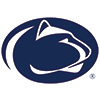 (POS: 4; OVR: 31)
(POS: 4; OVR: 31)
Yes, Sean Clifford is coming back, but he likely enters 2022 on a short leash after struggling in each of the last two years. Allar is clearly the future of the program at quarterback and is one of the highest-rated recruits in program history. At 6-foot-4 and 232 pounds with a strong arm to boot, it doesn't take much imagination to see Allar as a player who can hold up at this level whenever he's called upon. Again, it will take some major struggles from Clifford to lose the job. But unlike previous years, Penn State has an option waiting in the wings that can really turn up the heat on his job security if those struggles do occur.
Running Back
Nicholas Singleton, Penn State  POS: 1; OVR: 30
POS: 1; OVR: 30
The lone five-star at his position, Singleton sets up as the most interesting freshman back heading into the spring. The Pennsylvania native has a workhorse build at 6-foot and 210 pounds and he's already on campus so he'll be able to get acclimated to the offense in the spring.
Penn State has struggled to run the ball since Journey Brown had to step away from the game before the 2020 season. The team's leading rusher, Keyvone Lee, gained 530 yards on 108 carries over 13 games and the second-leading rusher, Noah Cain, has since transferred to LSU.
The path is there, both because of Singleton's own talent and presence on campus as an early enrollee and because of Penn State's lack of talent elsewhere in the backfield, for Singleton to be a contributor right away. I'm not trying to draw a direct parallel between Singleton and Saquon Barkley, but Penn State's run game languished in a similar fashion before Barkley righted the ship in 2016. Penn State ranked 118th in rushing last season. If Singleton is as good as we have reason to believe, that will change in a hurry.
Emmanuel Henderson, Alabama  POS: 2; OVR: 39
POS: 2; OVR: 39
Alabama loses Brian Robinson but gains Jahmyr Gibbs, who projects to have a huge role in this offense. The depth should be a little better than it was a year ago, too, with Jase McClellan coming back. Trey Sanders has not been able to stay healthy/produce enough to be a major roadblock to Henderson finding a role, but there are still a lot of bodies in front of the freshman and Gibbs' presence largely makes him a stay-away for me in redraft this year barring significant changes to the depth chart.
Jordan James, Oregon  POS: 16; OVR: 192
POS: 16; OVR: 192
The longtime Georgia commit from Tennessee was plucked by former UGA DC and newly minted Oregon head coach Dan Lanning on signing day and it drastically shifts James' chances at making an impact as a freshman.
Travis Dye (USC) has transferred and CJ Verdell is off to the NFL, leaving nearly 300 carries up for grabs, albeit in a different offense. Byron Cardwell looked promising in 2021 and should enter spring as the starter but there's more than enough room for James to carve out a role if he proves worthy. James checks in at 5-foot-10 and 205 pounds and amassed over 4,500 rushing yards in his high school playing days. He is thought to be an above-average athlete for his position.
He's on the fringe of the CFF redraft radar for now but he's certainly a name to remember as the offseason unfolds.
Rayshon Luke, Arizona  POS: 18; OVR: 207
POS: 18; OVR: 207
Nicknamed "Speedy", Luke is one of the gems of Arizona's class. He showed out in the Army All-American Bowl with a pair of touchdowns en route to being named the game's MVP.
This may not surprise you, but the 1-11 Wildcats didn't have an overly successful run game last season as they checked in at 96th nationally in yards per game and 100th in YPC. Oh, and they also scored six total rushing touchdowns. Combined. As a team. That ranked 128th out of 130 programs. Even Connecticut and Vanderbilt had more scores on the ground.
Clearly, this backfield needs fixing and Luke can be a game-changer. His speed coupled with Jalen John's powerful running style could give Arizona an interesting 1-2 punch in the backfield. If things break right, Luke could be the PAC-12 version of Keaton Mitchell this year.
Wide Receiver
Luther Burden, Missouri (POS: 1; OVR: 3)
This one is a bit of a layup. A five-star receiver going to an offense that's sorely lacking in proven options at that position. The team's leading receiver (Tauskie Dove) had 576 yards and no touchdowns. Missouri's other main threat in the receiving corps, Keke Chism, is out of eligibility. Even though Burden won't be on campus until the summer, the team context coupled with his elite talent means that he's a good bet to be a producer right away as a freshman. If Missouri has better injury luck at quarterback, the overall floor of the passing game will rise. Burden could be Missouri's best receiver since Jeremy Maclin.
Tetairoa McMillan, Arizona (POS: 5; OVER: 50)
As mentioned above, McMillan is the highest-rated recruit in program history. He's 6-foot-4 and 185 pounds out of Anaheim, CA and has a chance to lock down a role in three-wide sets given the roster turnover. Stanley Berryhill is gone to the NFL and Brian Casteel has transferred to Nevada, leaving over 40 percent of the targets up for grabs. UTEP transfer Jacob Cowing could take the Berryhill role but McMillan can be a field-stretcher and a red zone threat. I'm a little concerned that the frame could take some time to develop but McMillan is nonetheless a freshman to keep on your radar.
Evan Stewart (WR2, 11 OVR) and Chris Marshall (WR3, 24 OVR), Texas A&M 
Texas A&M needs to start getting better production from its receiving corps and this duo could be a catalyst. Only one Aggie receiver, Jalen Preston, drew more than 30 targets and had a YPT over 8.0 last season. Ainias Smith is an excellent player but the Aggies grew over-reliant on him and it started to have diminishing returns as his 81 targets went for just 509 yards.
Stewart and Marshall obviously have top-end talent and they also bring differing skill sets. Stewart, who has already enrolled, checks in at 6-foot and 175 pounds with an impressive track background. The fact that he has already enrolled will only help his cause at getting on the field early. He has drawn comps to DeVonta Smith, likely thanks to having a similarly lean frame, but it also speaks to his ability to win on his routes despite not being physically dominant. His athleticism is legit.
Marshall, on the other hand, is a bigger receiver at 6-foot-3 and 195 pounds who is just tapping into his football skills as he only began playing as a junior. He had over 1,000 yards and 18 touchdowns in 2020, his first season, and scored on 11 of his 15 receptions as a senior. He won't arrive on campus until the summer and his relative inexperience could lead to a learning curve that makes him more of a role player as a freshman. Still, it's hard to deny Marshall's innate talent and his frame projects well for an outside role. If Demond Demas and Moose Muhammad don't perform well, Marshall will be right on their heels for snaps.
Keep on the Radar: Jordan Hudson, TCU 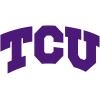 (POS: 15; OVR: 91); Kaden Saunders, Penn State
(POS: 15; OVR: 91); Kaden Saunders, Penn State  (POS: 7; OVR: 54); Barion Brown, Kentucky
(POS: 7; OVR: 54); Barion Brown, Kentucky  (POS: 17; OVR: 96)
(POS: 17; OVR: 96)


